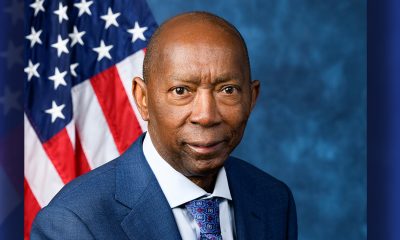Black History
COMMENTARY: California Congresswoman Maxine Waters Makes History
NNPA NEWSWIRE — Congresswoman Maxine Waters is now the first Black and the first woman to chair the powerful House Financial Services Committee. Having served on this committee since 1995, and its Ranking Member in the previous Congress, Waters will set the committee’s agenda in key areas affecting the economy, banking, housing, insurance and securities.
By Charlene Crowell, NNPA Newswire Contributor
As 2019 begins, there is also a new Congress with leadership in the House of Representatives that makes history for people of color and women alike.
Long-time California Representative Nancy Pelosi returns as Speaker of the House – the first time in 50 years that a Member of Congress has achieved this feat. On a gender note, Speaker Pelosi becomes the most powerful woman on Capitol Hill and the only female in the nation’s history to do so.
There’s also another key woman and legislator that is making history. Congresswoman Maxine Waters is now the first Black and the first woman to chair the powerful House Financial Services Committee. Having served on this committee since 1995, and its Ranking Member in the previous Congress, Waters will set the committee’s agenda in key areas affecting the economy, banking, housing, insurance and securities.
The House Financial Services Committee oversees the activities and responsibilities for major financial regulators, agencies, and the nation’s central bank, the Federal Reserve. These agencies include but are not limited to the Department of Housing and Urban Development (HUD), the Federal Deposit Insurance Corporation – that insures monies in depository institutions, as well as the Securities and Exchange Commission that is charged with maintaining fair and efficient investment markets.
In other words, the fiery and bold Black lawmaker who earned a reputation for challenging Wall Street and major lenders during the housing crisis will now set the direction for a range of financial players, regulators, and institutions. From monetary policy to the production and distribution of currency, and expanding financial access to affordable housing options, a progressive and principled committee chair is running the show. She is also expected to set standards of performance that level the financial playing field and hold lenders accountable when they take advantage of consumers or discriminate in their lending.
With the right kind of regulation and committee oversight, the nation may be able to change financial trends that have worsened both racial and gender wealth gaps.
For example, a December 2018 report by the Asset Funder’s Network analyzed racial and gender disparities in wealth and found that Black and Latina women have “lost substantial amounts of wealth in the last two decades”.
From 2007 to 2016, Black women ages 45-65 had a 74 percent drop in median wealth, compared to that of White women who experienced a 28 percent drop. Further, the Asset Funders Network concluded the median “quasi-liquid” savings for single Black and Latina women aged 45-50 was $0.
Earlier in 2017 the Federal Reserve found that nearly 1 in 5 black families have zero or negative net worth — twice the rate of white families. Additionally the median net worth of Black families was one-tenth of that held by White families.
These wealth disparities continue to plague communities of color in large part because of disparities in home ownership that enable consumers to build wealth. Year after year, the Home Mortgage Disclosure Act (HMDA) report has consistently found that consumers of color are denied access to mortgages, especially private conventional loans that remain the most sustainable and affordable loans.
Last year, the Center for Investigative Reporting published its analysis of the most recent HMDA report. “It found a pattern of troubling denials for people of color across the country, including in major metropolitan areas such as Atlanta, Detroit, Philadelphia, St. Louis and San Antonio,” states the report. “African Americans faced the most resistance in Southern cities – Mobile, Alabama; Greenville, North Carolina; and Gainesville, Florida – and Latinos in Iowa City, Iowa.”
A second but equally harmful trend is predatory lending that targets these same consumers with high-cost credit that creates debt traps. When consumers find themselves short of cash before paydays, overdraft fees, payday and car title loans are among the most predatory due to their extremely high interest rates and failure to consider whether borrowers have the financial capacity to repay the loans without taking on additional debt.
For all of Black America, as well as consumer advocates and others who believe financial fairness should be the nation’s watchword, an expectation of a new era of accountability, access and transparency is hoped to soon unfold.
“She is a tough and savvy defender of consumer protection and holds the feet of the banks and the Trump administration regulators to the fire,” said Mike Calhoun, president of the Center for Responsible Lending in a recent interview.
Should anyone doubt the resolve of Congresswoman Waters, consider her reaction last fall when she and other prominent progressives faced a series of bomb threats and other violence.
“We have to keep doing what we’re doing in order to make this country right,” Waters told the Washington Post. “That’s what I intend to do. And as the young people say, ‘I ain’t scared.’”
Charlene Crowell is the Center for Responsible Lending’s Communications Deputy Director. She can be reached at Charlene.crowell@responsiblelending.org.
Activism
Oakland Post: Week of March 28 – April 1, 2025
The printed Weekly Edition of the Oakland Post: Week of March 28 – April 1, 2025

To enlarge your view of this issue, use the slider, magnifying glass icon or full page icon in the lower right corner of the browser window.
Activism
Report Offers Policies, Ideas to Improve the Workplace Experiences of Black Women in California
The “Invisible Labor, Visible Struggles: The Intersection of Race, Gender, and Workplace Equity for Black Women in California” report by the California Black Women’s Collective Empowerment Institute (CBWCEI), unveiled the findings of a December 2024 survey of 452 employed Black women across the Golden State. Three-fifths of the participants said they experienced racism or discrimination last year and 57% of the unfair treatment was related to incidents at work.

By McKenzie Jackson, California Black Media
Backed by data, a report released last month details the numerous hurdles Black women in the Golden State must overcome to effectively contribute and succeed in the workplace.
The “Invisible Labor, Visible Struggles: The Intersection of Race, Gender, and Workplace Equity for Black Women in California” report by the California Black Women’s Collective Empowerment Institute (CBWCEI), unveiled the findings of a December 2024 survey of 452 employed Black women across the Golden State. Three-fifths of the participants said they experienced racism or discrimination last year and 57% of the unfair treatment was related to incidents at work.
CBWCEI President and CEO Kellie Todd Griffin said Black women have been the backbone of communities, industries, and movements but are still overlooked, underpaid, and undervalued at work.
“The data is clear,” she explained. “Systemic racism and sexism are not just historical injustices. They are active forces shaping the workplace experiences of Black women today. This report is a call to action. it demands intentional polices, corporate accountability, and systemic changes.”
The 16-page study, conducted by the public opinion research and strategic consulting firm EVITARUS, showcases the lived workplace experiences of Black women, many who say they are stuck in the crosshairs of discrimination based on gender and race which hinders their work opportunities, advancements, and aspirations, according to the report’s authors, Todd Griffin and CBWCEI researcher Dr. Sharon Uche.
“We wanted to look at how Black women are experiencing the workplace where there are systematic barriers,” Todd Griffin told the media during a press conference co-hosted by Ethnic Media Services and California Black Media. “This report is focused on the invisible labor struggles of Black women throughout California.”
The aspects of the workplace most important to Black women, according to those surveyed, are salary or wage, benefits, and job security.
However, only 21% of the survey’s respondents felt they had strong chances for career advancement into the executive or senior leadership ranks in California’s job market; 49% felt passed over, excluded from, or marginalized at work; and 48% felt their accomplishments at work were undervalued. Thirty-eight percent said they had been thought of as the stereotypical “angry Black woman” at work, and 42% said workplace racism or discrimination effected their physical or mental health.
“These sentiments play a factor in contributing to a workplace that is unsafe and not equitable for Black women in California,” the report reads.
Most Black women said providing for their families and personal fulfillment motivated them to show up to work daily, while 38% said they were dissatisfied in their current job with salary, supervisors, and work environment being the top sources of their discontent.
When asked if they agree or disagree with a statement about their workplace 58% of Black women said they feel supported at work, while 52% said their contributions are acknowledged. Forty-nine percent said they felt empowered.
Uche said Black women are paid $54,000 annually on average — including Black single mothers, who averaged $50,000 — while White men earn an average of $90,000 each year.
“More than half of Black families in California are led by single Black women,” said Uche, who added that the pay gap between Black women and White men isn’t forecasted to close until 2121.
Alameda County
Trump Order Slashes Federal Agencies Supporting Minority Business and Neighborhood Development
The latest executive order targeted several federal agencies, including the Minority Business Development Agency (MBDA) and the Community Development Financial Institutions Fund, ordering that their programs and staff be reduced “to the minimum presence and function required by law.” The executive order targeted more agencies that Trump “has determined are unnecessary,” the order stated.

By Brandon Patterson
On March 14, President Trump signed an executive order slashing the operations of two federal agencies supporting growth in minority business and neighborhoods as he continued his attacks on programs supporting people of color and on the size of the federal bureaucracy.
The latest executive order targeted several federal agencies, including the Minority Business Development Agency (MBDA) and the Community Development Financial Institutions Fund, ordering that their programs and staff be reduced “to the minimum presence and function required by law.” The executive order targeted more agencies that Trump “has determined are unnecessary,” the order stated.
The MBDA’s mission is to “promote the growth and global competitiveness” of minority business enterprises, or MBEs. In 2023, according to its website, the agency helped MBEs access $1.5 billion in capital and facilitated nearly $3.8 billion in contracts awarded to minority business enterprises. It also helped MBEs create or sustain more than 19,000 jobs nationwide. Similarly, the CDFI Fund supports economic growth in under-invested communities by providing funding and technical assistance to local CDFIs, including banks, loan funds, and credit unions, that support community development projects in cities across the country. In 2023, the fund supported more than 1,400 local CDFIs across the country, including more than 80 in California — among the highest number for any state in the country.
The MBDA has local satellite business centers operated by organizations that support minority clients with services such as business consulting, contract bid preparation, loan packaging, and accessing capital funding. The San Francisco Bay Area business center is San Jose, operated by San Francisco-based organization Asian, Inc. Meanwhile, local Oakland CDFIs supported by the federal CDFI fund since 2021 include Habitat Community Capital, TMC Community Capital, Gateway Bank Federal Savings Bank, Beneficial State Bancorp, Inc., and Main Street Launch.
“It is clear that the hollowing out of the CDFI Fund and MBDA is not being ordered because those programs have failed in their mission,” the CEO of Small Business Majority John Arensmeyer, a national organization that advocates for small businesses, said in a statement on Saturday. “Instead, it is yet another case of President Trump using DEI as a club to eviscerate programs that seek to level our economic playing field.”
Congresswoman Lateefah Simon also slammed the decision in a statement to the Oakland Post. “As a member of the House Small Business Committee who represents multiple CDFIs in CA-12, I believe Trump’s gutting of operations at the Minority Business Development Agency and at the Community Development Financial Institutions Fund is a direct attack on small businesses, communities of color and other underserved communities,” Rep. Simon said. “Both the MBDA and the CDFI Fund were created with bipartisan support to help historically underserved communities and small businesses — and both programs have helped to dramatically change the material realities of people and bolster entrepreneurship in the U.S. There is no logic to this decision. The point is discrimination and cruelty.”
-

 #NNPA BlackPress4 weeks ago
#NNPA BlackPress4 weeks agoTarget Takes a Hit: $12.4 Billion Wiped Out as Boycotts Grow
-

 Activism4 weeks ago
Activism4 weeks agoUndocumented Workers Are Struggling to Feed Themselves. Slashed Budgets and New Immigration Policies Bring Fresh Challenges
-

 #NNPA BlackPress4 weeks ago
#NNPA BlackPress4 weeks agoBREAKING Groundbreaking Singer Angie Stone Dies in Car Accident at 63
-

 #NNPA BlackPress4 weeks ago
#NNPA BlackPress4 weeks agoNAACP Legend and Freedom Fighter Hazel Dukes Passes
-

 Arts and Culture4 weeks ago
Arts and Culture4 weeks agoBeverly Lorraine Greene: A Pioneering Architect and Symbol of Possibility and Progress
-

 #NNPA BlackPress4 weeks ago
#NNPA BlackPress4 weeks agoTrump Kicks the Ukrainian President Out of the White House
-

 #NNPA BlackPress4 weeks ago
#NNPA BlackPress4 weeks agoApple Shareholders Reject Effort to Dismantle DEI Initiatives, Approve $500 Billion U.S. Investment Plan
-

 Activism3 weeks ago
Activism3 weeks agoOakland Post: Week of March 5 – 11, 2025



























































